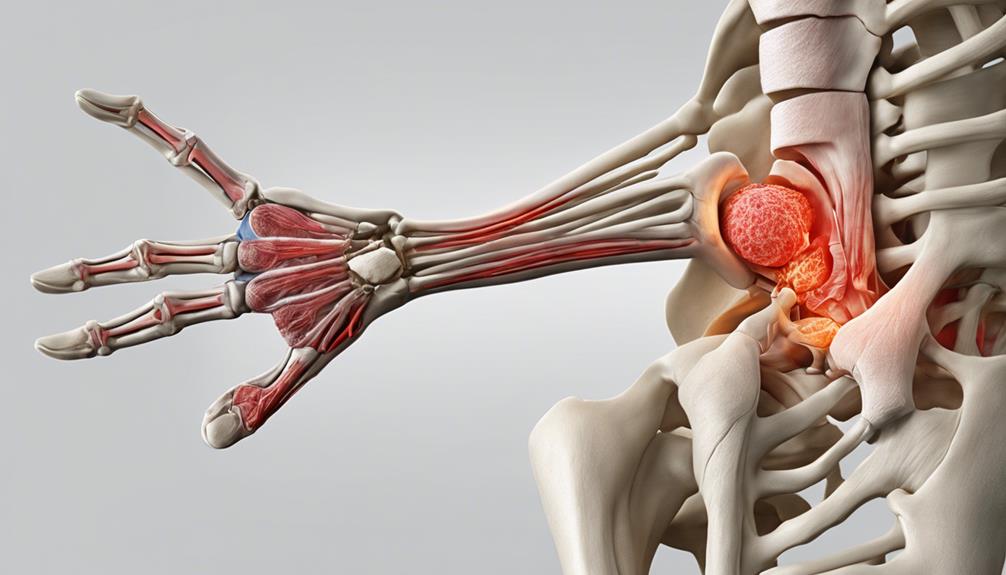When it comes to arthritis, the vast amount of information out there can be overwhelming for many. Fortunately, Piedmont Arthritis offers a unique approach.
By honing in on specific symptoms and causes, we aim to demystify this condition and offer practical insights.
In exploring how lifestyle adjustments and advanced treatments can impact Piedmont Arthritis management, a clearer path to relief emerges.
Join us as we uncover the nuances of Piedmont Arthritis and how patients can navigate their journey towards improved quality of life.
Key Takeaways
- Joint pain, swelling, and stiffness are common symptoms of Piedmont Arthritis.
- Autoimmune disorders, infections, and genetic factors can contribute to Piedmont Arthritis.
- Early detection and treatment are crucial for managing Piedmont Arthritis symptoms.
- Lifestyle modifications and treatment options play key roles in managing Piedmont Arthritis.
Understanding Piedmont Arthritis Symptoms
What're the key symptoms of Piedmont Arthritis that individuals should be aware of?
Piedmont Arthritis symptoms encompass a range of manifestations that can significantly impact daily life. Joint pain, a hallmark of this condition, is often accompanied by stiffness and swelling. These symptoms can lead to reduced range of motion, affecting tasks requiring joint flexibility.
Patients with Piedmont Arthritis may also experience systemic effects such as fatigue, fever, and weight loss, which can contribute to an overall decline in well-being. Furthermore, joint deformities may develop as the disease progresses, causing additional challenges for individuals.
It's crucial to note that the severity of Piedmont Arthritis symptoms can vary among patients and may fluctuate over time, underscoring the need for consistent monitoring and management. Additionally, Piedmont Arthritis symptoms can affect various joints, including those in the hands, wrists, knees, and feet, highlighting the diverse nature of this condition.
Early detection and treatment play a pivotal role in controlling symptoms and enhancing the quality of life for those with Piedmont Arthritis.
Common Causes of Piedmont Arthritis

Autoimmune disorders like rheumatoid arthritis and lupus are among the primary causes of Piedmont Arthritis. These conditions occur when the immune system mistakenly attacks healthy tissues, leading to joint inflammation and damage.
In addition to autoimmune disorders, several other factors can contribute to the development of Piedmont Arthritis:
- Joint Injury: Trauma to the joints, whether from accidents, sports injuries, or repetitive strain, can increase the likelihood of developing Piedmont Arthritis. Damage to the joint structures can trigger an inflammatory response, leading to chronic joint pain and swelling.
- Infection: Certain infections, such as Lyme disease or viral infections, can act as triggers for Piedmont Arthritis. Infections may initiate an inflammatory reaction in the joints, causing prolonged joint symptoms and potential long-term complications.
- Genetic Predisposition: A family history of arthritis or related autoimmune conditions can predispose individuals to developing Piedmont Arthritis. Genetic factors can influence the immune response and the body's ability to regulate inflammation, contributing to the onset of arthritis symptoms.
Diagnosis and Testing for Piedmont Arthritis
Utilizing state-of-the-art diagnostic tools and comprehensive testing methods, Piedmont Arthritis Clinic meticulously evaluates patients to accurately diagnose and assess arthritis conditions. The clinic offers a range of diagnostic services, including imaging studies, blood tests, and joint fluid analysis, to pinpoint the specific type and severity of arthritis affecting individuals. Advanced testing methods such as ultrasound and MRI are employed to assess joint damage and inflammation effectively. The board-certified physicians at Piedmont Arthritis Clinic conduct thorough physical examinations and specialized tests to provide a detailed understanding of each patient's arthritis condition. Additionally, state-of-the-art technology like X-rays and bone scans is utilized for precise diagnosis and evaluation of joint health.
| Diagnostic Services | Advanced Testing Methods | Specialized Tests |
|---|---|---|
| Imaging studies | Ultrasound | Physical examinations |
| Blood tests | MRI | Joint fluid analysis |
Managing Piedmont Arthritis Through Lifestyle

Implementing strategic lifestyle modifications, including regular exercise and a balanced diet, is instrumental in effectively managing Piedmont Arthritis symptoms. Lifestyle choices can significantly impact the progression and severity of the condition. Here are three key strategies for managing Piedmont Arthritis through lifestyle:
- Adequate Rest and Stress Management Techniques: Ensuring proper rest and implementing stress management techniques can help reduce inflammation and pain associated with Piedmont Arthritis. Relaxation techniques such as deep breathing exercises and mindfulness meditation can be beneficial.
- Maintaining a Healthy Weight: Being overweight can put extra strain on the joints, exacerbating Piedmont Arthritis symptoms. A balanced diet and regular exercise can help individuals maintain a healthy weight, reducing the burden on the joints and slowing disease progression.
- Avoiding Smoking: Smoking has been linked to increased inflammation and can worsen arthritis symptoms. Quitting smoking can have a positive impact on overall health and help manage Piedmont Arthritis more effectively.
Treatment Options for Piedmont Arthritis
At Piedmont Arthritis Clinic, our specialized physicians craft personalized treatment plans to address various forms of arthritis, such as rheumatoid arthritis, psoriatic arthritis, and lupus, ensuring comprehensive care tailored to each patient's unique needs and condition. Our treatment options encompass a range of modalities aimed at managing symptoms and improving quality of life. Below is a table outlining some of the key treatment options available at our clinic:
| Treatment Options | Description | Benefits |
|---|---|---|
| Medication Management | Prescription medications to alleviate pain, reduce inflammation, and slow disease progression | Improved symptom control |
| Physical Therapy | Tailored exercises to enhance mobility, strength, and joint function | Increased flexibility and range of motion |
| Pain Management Solutions | Techniques to help patients cope with chronic pain | Enhanced pain relief and comfort |
| Patient Education | Informative sessions on arthritis management strategies | Empowerment through knowledge |
| Comprehensive Care | Holistic approach focusing on overall well-being and symptom management | Improved quality of life |
Frequently Asked Questions
Can Piedmont Arthritis Be Prevented Through Specific Dietary Changes or Supplements?
We can prevent arthritis through a balanced diet rich in anti-inflammatory foods like fruits, vegetables, whole grains, and healthy fats. Supplements such as omega-3 fatty acids and turmeric may also help reduce inflammation.
Regular exercise is crucial for maintaining joint health. Lifestyle modifications like maintaining a healthy weight and avoiding smoking can also lower the risk of developing arthritis.
Consulting a healthcare provider for personalized recommendations is advisable.
Are There Any Alternative Therapies or Complementary Treatments That Can Help Manage Piedmont Arthritis Symptoms?
Absolutely, there are alternative therapies and complementary treatments that can help manage various health conditions. These options may include acupuncture, meditation, yoga, and massage therapy.
Each of these practices has shown positive effects in improving symptoms and overall well-being. When seeking relief from health issues, exploring these alternative avenues can provide additional support and enhance traditional medical treatments.
It's essential to consider all available options when aiming for holistic health.
How Does Weather or Climate Affect Piedmont Arthritis Flare-Ups?
Weather and climate changes can impact arthritis flare-ups. Temperature, humidity, and barometric pressure shifts may trigger increased pain and stiffness. Understanding these factors allows for better symptom management.
Monitoring weather patterns and adjusting activities accordingly can help minimize flare-ups. By staying informed and proactive, individuals can better navigate the impact of weather on arthritis symptoms, leading to improved quality of life.
Is There a Link Between Piedmont Arthritis and Other Medical Conditions, Such as Heart Disease or Diabetes?
Absolutely, there's a definitive link between Piedmont Arthritis and other medical conditions. For instance, studies show that individuals with Piedmont Arthritis have a higher risk of developing heart disease and diabetes.
This connection emphasizes the importance of comprehensive care for those with Piedmont Arthritis, addressing not only joint health but also monitoring and managing other potential health risks.
It underscores the need for a holistic approach to managing this condition.
Are There Any Specific Exercises or Physical Activities That Should Be Avoided if Diagnosed With Piedmont Arthritis?
When diagnosed with arthritis, it's crucial to carefully select exercises to avoid worsening symptoms. High-impact activities like running or jumping may strain joints and cause discomfort.
Instead, opt for low-impact exercises such as swimming, cycling, or walking. Strengthening exercises focusing on core stability and range of motion can be beneficial.
Consulting with a healthcare provider or physical therapist for personalized recommendations is advisable to ensure a safe and effective exercise plan.
Conclusion
In conclusion, Piedmont Arthritis Clinic offers specialized care for arthritis and autoimmune diseases, with a team of experienced physicians dedicated to patient comfort and satisfaction.
By focusing on personalized treatment plans and comprehensive care, patients can effectively manage their symptoms and improve their quality of life.
From diagnosis to treatment, Piedmont Arthritis Clinic provides the expertise and support needed to navigate the challenges of living with arthritis.
Experience relief and empowerment with Piedmont Arthritis Clinic today.









